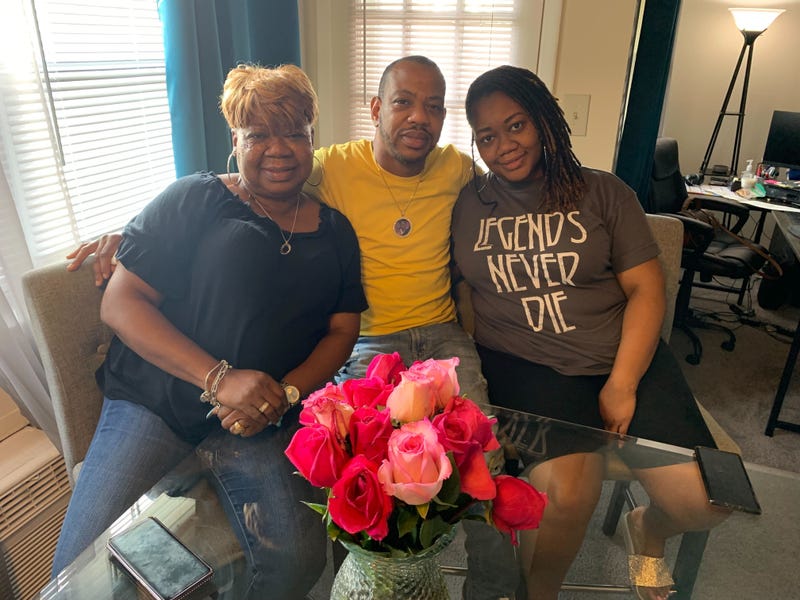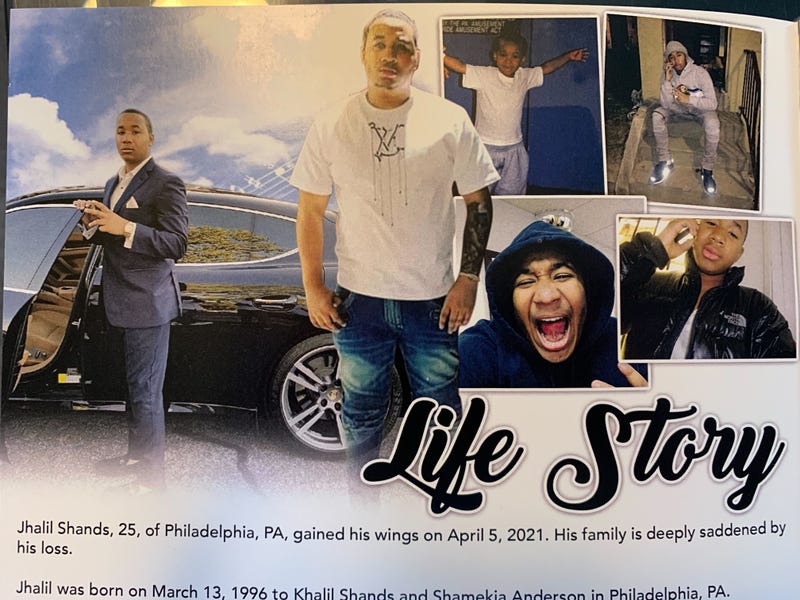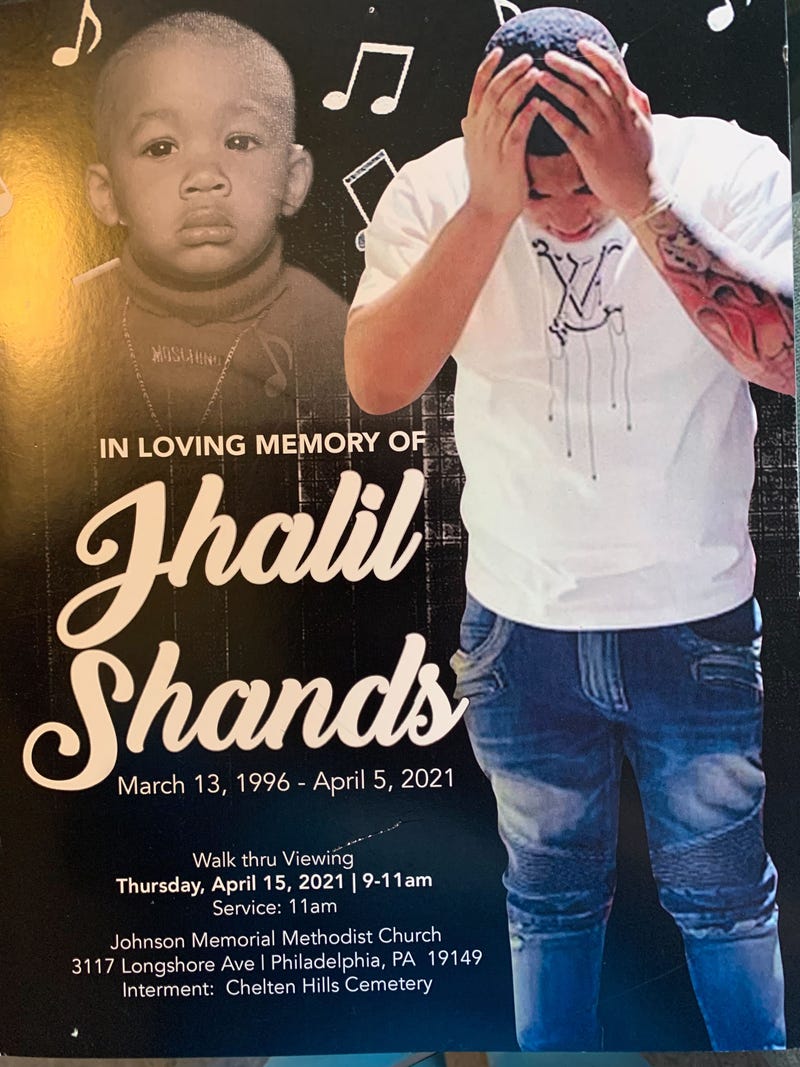
🎧 Listen to Ricochet, a limited podcast series on Philadelphia’s gun violence crisis
PHILADELPHIA (KYW Newsradio) — On any given night, Old City is bustling with tourists and nightlife. It is home to the Declaration of Independence and dozens of other historical sites. Many presidents and leaders have spoken outside neighborhood landmarks to crowds of thousands. Schools from all over the country bus in their students to learn about American history. It’s a seemingly safe part of Philadelphia.
Upscale restaurants, music venues and bars attract 20-somethings, like Jhalil Shands and his longtime girlfriend of six years. After dinner at Buddakan on April 5, 2021, they decided to walk around the neighborhood, passing by other couples dining at restaurants outside.
But on that warm spring evening, a van pulled up and three men jumped out. They fired more than two dozen shots at Shands. After years together, and a proposal likely on the way, she watched as the bullets evaded her but killed Shands. He was 25 years old.
Shands was ambitious, according to his family, and everybody loved him. He was jovial and kind and had loyal friends and family. He called his grandmothers often and loved to travel with his family. He had a good life yet still got mixed up in the world of violence.

He had been arrested several times before — all for non-violent crimes — and spent some time behind bars. In one instance, he was arrested with a few members of a gang inside a stolen car, with two guns and more than two dozen rounds of ammunition.
Shands — again, never accused of any type of violence — was targeted twice before his death. A week after he was released from prison, he was shot but survived. Three months before his death, police believe he was the intended target of another homicide — the killing of 17-year-old Dreyon Hart in North Philadelphia.
Both Hart and Shands’ cases remain unsolved. Shands’ family is frustrated by that — in one of the most popular parts of the city, with people all around and cameras and iPhones always watching, no one has been arrested.

“We have these cameras that can tell us we’re going too fast. We have these cameras that can tell us where we ran a red light … but we don’t have a camera that can solve a murder,” said Jhalil’s father, Khalil Shands.
The family struggles to understand how a group like that would wait for their prey to emerge and boldly pounce in a neighborhood filled with tourists and families out and about.
“I’m wondering if they are loved. Or, do they love anybody? How do you go out and do all these things, kill all these people? Do you have a family?” said Jhalil’s grandmother, Robin Shands. “This is somebody that was dear to you, [it] happens to you — how would you feel?”
Jhalil’s family remembered growing up in a different era of city violence. Guns weren’t used as frequently as they are today.
“It was just hands and that was it,” said Jhalil’s aunt, Angela Shands. “It was like, OK, let’s resolve this conflict. It was never loss of life.”
“Gang wars back then, women and children were off limits. Now, they’re shooting anybody and everybody. They don’t care,” said Robin.
“When I was coming up, it was more so about the corners and the drugs and the money. If you just mind your business, you were fine. Now if you mind your business, you’re still not fine,” added Khalil.
The only option
The gang that police believe Jhalil belonged to has ongoing feuds with two other groups. Unfortunately, if you live in certain neighborhoods and don’t belong to a group, you are as much of a target as if you do.
It’s often said that race, poverty and trauma contribute to gun violence. However, trauma may not stem from a specific event — it’s how people feel, what they think and how they respond to that event that can make it traumatic. And, it’s how adults respond around children.
“If we’re a young child and something out of the ordinary and upsetting happens, but our caregivers are able to respond by wrapping around us and helping us to feel safe and secure, that stressor can go away,” said Dr. Caroline Watts, a psychologist at the University of Pennsylvania, “that’s very different than when we have, for example, communities that are wiped out by sudden storms, where all of the ordinary, comforting, familiar settings and relationships we have are gone. Or, as we’re experiencing right now in Philadelphia, when whole communities are now dealing with day-to-day episodes of violence and death and grief.”
When shootings repeatedly happen over and over again in the same neighborhoods, with little support, it can be incredibly harmful to the people who live there. Race also comes into play.
“Part of the issue is, if you start the analysis only in the last year around the stats on violence, but you don’t look at the last five years of how many protective factors are missing compared to other neighborhoods, did you get a real understanding of not only wealth differences but racial differences?” asked Dr. Howard Stevenson, another Penn psychologist.
“As much as parents are doing their best to protect [their kids], they feel helpless,” he continued. “But the bigger issue is, [mom] can’t protect me. You have masculinity dynamics interacting with the sense of safety. And, in a stereotypical world, toxic masculinity seems almost like a good option, if you think that’s going to protect you.
“They never stopped being children because their neighborhood has been dangerous. They had to develop a coping strategy that had to deal with the reality.”
🎧 LISTEN TO EPISODE 5 NOW
Gun violence continues to plague cities across the country. In Philadelphia, people are shot every day. Over the last five years, we’ve gathered interviews and stories from victims and their families, suspects, defendants, and people on the frontlines of the violence. In the final episode of Ricochet, hear more from Jhalil’s family and other mothers who have lost their children to gun violence, how trauma impacts both parents and children, how race and toxic masculinity are tied into the cycle of violence, and what kids need in order to see a different path.
Listen to all episodes of Ricochet on the Audacy app or wherever you get your podcasts. Follow Gone Cold: Philadelphia Unsolved Murders for more. Read more from Ricochet here.
Article written by Rachel Kurland. Podcast written and hosted by Kristen Johanson and produced by Sabrina Boyd-Surka, with production assistant Winston Harris.
